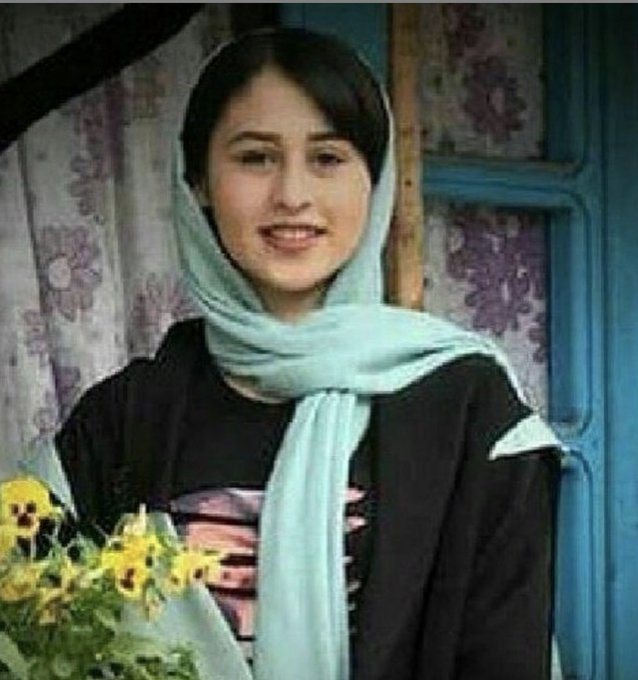
Romina Ashrafi is the teenage Iranian girl who was brutally murdered in her own home in a so-called “honor killing.”
The local news outlet Gilkhabar.ir reported that Ashrafi’s father, Reza, used a farming sickle to behead her while she was sleeping. The newspaper cited “locals” who said that Reza Ashrafi walked out of his home with the sickle in his hand, confessed to killing his daughter and was arrested.
Ashrafi, who was either 13 or 14 years old, had run away from home with her 34-year-old boyfriend and her father objected to the relationship, the Associated Press reported. Ashrafi and her boyfriend were apprehended five days later. Law enforcement officials forced the teen to return home, even though she expressed fear that her father would become violent.
Here’s what you need to know:
Ashrafi’s Father Will Not Face the Death Penalty Because He Was Her Legal Guardian
Romina Ashrafi’s father will face a maximum of 10 years in prison if he is convicted for her murder. Sky News, citing Iran’s judicial department, reported that the trial will take place in a special court.
According to Article 220 of the Islamic Penal Code in Iran, Ashrafi’s father cannot face the death penalty because he was her legal guardian. The current legal code states that guardians are exempt from “quisas,” meaning “retaliation in kind,” the Arab television station Al Arabiya explained. The outlet cited a former Iranian senior official, Hadi Mostafaei, who said in 2014 that 20 percent of the country’s murder cases were so-called “honor killings.”
Iran International further explained that under Sharia law, the only people who could call for Reza Ashrafi’s execution, in this case, would be his own family members. The TV station used the term “blood owners” to describe immediate relatives and explained that this is the reason why most “honor killings” are not met with severe punishment.
The non-governmental advocacy organization Human Rights Watch describes honor crimes as “acts of violence, usually murder, committed by male family members against female family members who are perceived to have brought dishonor upon the family.” The group says girls and women have been killed for leaving abusive marriages or rejecting arranged marriages. Another common reason is if a woman is the victim of a sexual assault or rape.
In reaction to Ashrafi’s murder, Iranian President Hassan Rouhani has called on lawmakers to fast-track a bill that would impose harsher sentences against “honor killings.” The vice president of Iran for Women and Family Affairs, Masoumeh Ebtekar, also called for a special investigation. Al Jazeera reported Ashrafi’s murder had sparked outrage across Iran.
Members of Both Families Alerted Authorities After Ashrafi & Her Boyfriend Ran Away
Romina Ashrafi was from the city of Talesh in the northern Gilan province, which is about 260 miles northwest of the capital city of Tehran. Iran International reported that the teenager had “fallen in love with a boy” from her city but did not include that the “boy” was a 34-year-old man. Al Arabiya English added that Ashrafi ran away with her boyfriend after her father objected to her wish to marry him.
The AP identified Ashrafi’s boyfriend as Bahamn Khavari. The couple went on the run for five days before they were apprehended by the police. His family had also alerted law enforcement after the pair disappeared, according to Radio Free Europe. Ashrafi told officials she was afraid to go home and that she feared for her life. The local outlet Gilkhabar.ir reported that after Ashrafi was forced to return home, “family disputes and provocations escalated,” ultimately resulting in the teenager’s death.
Khavari, however, is not expected to face any repercussions. Radio Farda, the Iranian branch of Radio Free Europe, explained Khavari would likely not face any charges because teenage girls are considered ready for marriage by age 13.
However, young teenage brides are less common in Iran in the present day. The Tehran Times reported in 2018 that the average Iranian woman is 23 years old when she gets married.
Bahamn Khavari Says He Loved Romina Ashrafi & Told an Iranian News Site That He Had to Listen As She Was Killed
The Iranian news website Khabar Online spoke with Bahamn Khavari after Romina Asharfi’s death. In that article, Khavari was described as being 28 years old and that Ashrafi was 13.
According to a Google translation of the article from Persian to English, Khavari said he had loved Ashrafi since she was 9 years old and that they began talking over the phone when she was 11. Khavari claimed that he asked Ashrafi’s father for permission to marry her but that the request was denied.
As for the age difference, Khavari said he did not see a problem with it. He theorized that if he had been a wealthier man, Ashrafi’s father would have accepted the relationship. “When a rich 70-year-old man comes, he marries a 20-year-old girl, because money is not a crime. But is it my fault that I loved this girl and wanted to save her?” Khavari said that when he and Ashrafi ran away, they hid at his sister’s home.
Khavari claimed that after he and Ashrafi were caught and forced to return home, Ashrafi’s father and uncle had already made plans to kill her. Khavari explained that the day the teen was forced back to her family’s house, he received a phone call from the house. Khavari said he heard Reza Ashrafi on the phone, and then heard the sound of the farming sickle. He added that after Reza was arrested, he made additional verbal threats. Khavari said Reza threatened to kill his own wife and Khavari if he was released from custody.
READ NEXT: Should You Wear a Mask & Gloves to the Gym?
